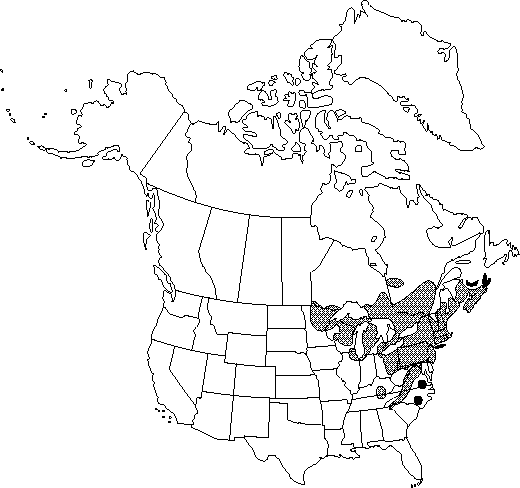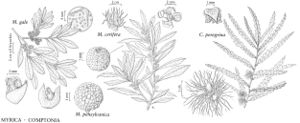Comptonia peregrina
Mem. Torrey Bot. Club 5: 127. 1894.
Shrubs, to 1.5 m, forming rhizomatous colonies. Branchlets redbrown to gray, pilose to villose, sometimes puberulent. Leaves: stipules nearly cordate, long-acuminate. Leaf-blade very aromatic when crushed, 3-15.5 × 0.3-2.9 cm, lobes alternate to nearly opposite, base truncate, cuneate to attenuate, or oblique, apex acute; surfaces abaxially pale gray-green, densely pilose to puberulent, adaxially dark green, densely pilose to glabrate, gland-dotted, especially adaxially. Inflorescences: staminate in clusters at ends of branches, elongating to 5 cm, bracts broadly ovate to trullate, margins ciliate, apex acute to long-acuminate, abaxially gland-dotted; pistillate to 5 mm at anthesis, elongating in fruit to 2 cm, bracteoles to 1.3 cm, pilose, gland-dotted. Fruits 2.5-5.5 mm.
Phenology: Flowering spring, fruiting summer.
Habitat: Dry, sterile, sandy to rocky soils in pinelands or pine barrens, clearings, or edges of woodlots
Elevation: 0-1800 m
Distribution

N.B., N.S., Ont., P.E.I., Que., Conn., Del., Ga., Ill., Ind., Ky., Maine, Md., Mass., Mich., Minn., N.H., N.J., N.Y., N.C., Ohio, Pa., R.I., S.C., Vt., Va., W.Va., Wis.
Discussion
Comptonia peregrina has been reported from Tennessee (Scott County), but I have not seen any specimens.
Many Native American tribes used different parts of Comptonia peregrina variously: as an incense for ritual ceremonies; for medicinal purposes; as a stimulant or tonic; as a food seasoning; and as a poison (D. A. Moerman 1986).
Selected References
None.
Lower Taxa
"elongating" is not a number. "elongating" is not a number.
